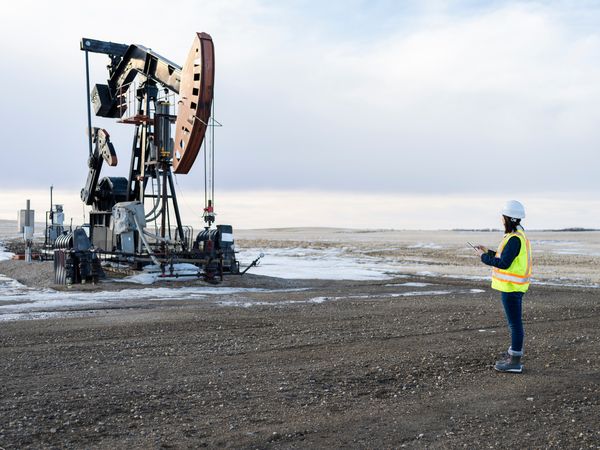
Source: ConocoPhillips
Even before oil prices swooned, there was trouble in the offshore drilling market. Oil companies were pulling back the reins on spending as they were struggling to make money drilling from oil in the deepwaters of the world's oceans even at a triple-digit oil price. Having said that, the offshore industry is vital to the future of oil supplies, which is why Schlumberger Limited (SLB +1.56%) is working toward a solution to make it more profitable for its customers.
Getting in too deep
There isn't a whole lot of positives coming out of the offshore drilling market of late. ConocoPhillips (COP +1.99%) recently decided to completely abandon its operated deepwater exploration program in the Gulf of Mexico to save money. In doing so ConocoPhillips terminated its rig contract paying the drilling contractor a hefty termination fee. However, ConocoPhillips would rather pay out that one-time fee than be saddled with the development costs of drilling for oil in the deepwater as it sees better value spending that money elsewhere.
Meanwhile, Seadrill (SDRL +0.00%) recently canceled the order of a long delayed drilling rig. That rig was nearly complete and was scheduled to start a 5-year drilling contract in the Atlantic next year. However, given the current market Seadrill decided to cancel the rig and get its deposit back with the hope that it could lease one of its other rigs to that customer. Clearly, these are troubling times for the offshore drilling industry.
An ocean of opportunity
Having said all that, the oil that's waiting to be discovered and produced offshore will still be needed by the industry at some point. As such, the industry will need to find a way to develop it much more economically than it has been doing in the past. This is where Schlumberger believes it can be of greater service. On its most recent conference call, CEO Paal Kibsgaard discussed the need for the industry to work together to make these projects more economical. He said that,
Now, going forward, in terms of sanctioning new projects, I think it's going to be very important for the industry -- the service industry together with our customers -- to be able to come up with technical solutions and field development plans that significantly reduces cost per barrel. And if we can do that, which is the overall objective for the industry, I think we can make many of the pending deepwater projects also economically viable in the future.
Kibsgaard notes that this needs to be a collaborative effort between oil producers and service providers to attack the problem of cost. If they can solve that problem, it makes many of the pending projects more economically viable, which would open up the door for new projects -- both would be welcomed news for Seadrill and its peers.

Source: Seadrill
This idea of driving down costs is one reason why Schlumberger went out and made an offer to acquire Cameron International. It believes that the combination will create the industry's first complete drilling and production system. In commenting on the acquisition in the press release announcing the deal Kibsgaard said that,
We believe that the next industry technical breakthrough will be achieved through integration of Schlumberger's reservoir and well technologies with Cameron's leadership in surface, drilling, processing and flow control technologies. Deep reservoir knowledge further enabled by instrumentation, software and automation, will launch a new era of complete drilling and production system performance.
In essence, what Schlumberger is doing is attacking the problem of cost on its end by forming what Kibsgaard called a "pore-to-pipeline" (i.e. end-to-end) solution of products and services. That will enable the company to strip out costs internally so that it can offer less expensive solutions to its customers.
Having said that, this is only part of the solution. The other part is working directly with offshore oil producers like ConocoPhillips much earlier on in the project lifecycle. Kibsgaard has called for a structural change in how offshore projects are designed suggesting that it should be a collaboration from the start. On the company's first-quarter conference call he said that,
We believe that the industry needs to think differently, in order to reduce project costs and increase project value. And we see closer collaboration between operators and the large service companies as a key element in achieving this goal. And this closer collaboration should also include more performance-based contracting models, which we are fully prepared to enter into.
In other words, Schlumberger wants a seat at the table, literally. It wants to be there and help design projects in exchange for a performance-based contract as opposed to a fixed-fee contract so that it can participate in the upside it is creating. It's a bold model that could be a key to delivering better outcomes from offshore drilling.
Investor takeaway
These are dark days in the offshore drilling market as rig contractors like Seadrill are losing work because overall development costs are just too high. Schlumberger, however, believes it has a solution to the problem and that solution involves a more collaborative way of developing these projects. It believes that if it can work directly with offshore oil producers, it can bring costs down to make projects much more economically viable. It's even willing to give up fixed fee service contracts to do so as it would rather participate on the upside of this effort because it truly believes that this is what will drive the most value creation for all involved.







